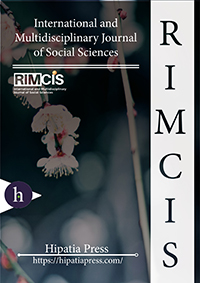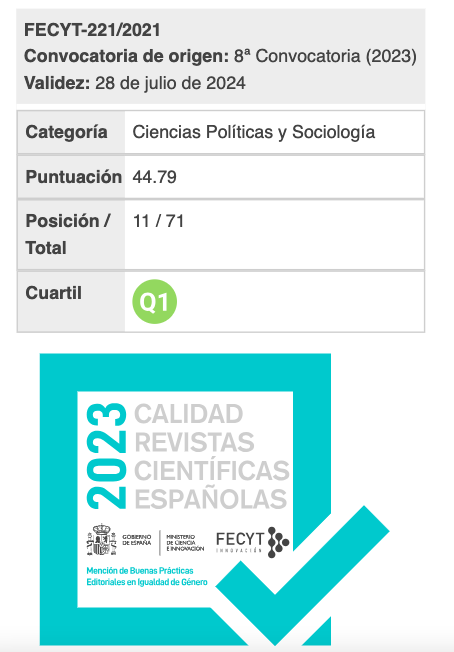Women, Gender, Feminism: Marginalization at the Inception of the World Social Forum
Keywords:
Downloads
Abstract
The World Social Forum (WSF) is a biannualmeeting space for the globaljustice movement that facilitates the coordination of worldwide events andprotests around a variety of social justice issues. I argue that although theprinciples of the WSF are based on feminist methods of participation, theresearch presented here demonstrates that women, gender, and feminism weremarginalized in the program and content at the forum’s inception. Empiricallythe paper presents the structure of programming and a quantitative examinationof women’s and feminist groups’ participation of the first years of the WSFprocess. I consider the thematic development of the WSF and role ofinformation sharing and intersectionality as feminist principles wereincorporated into the WSF. I refer to various theoretical perspectives on genderincluding feminist political economy, postcolonialism,and queer theory tomake sense of feminist participation and marginalization at the World SocialForum.Downloads
References
Articulación Feminista Marcosur. (2005). “Noticia forummentalismos: Las contradicciones del forum social mundial.” Retrieved from www.choike.org/nuevo/informes/2554.html
Google Scholar CrossrefBaumgardener J. & A. Richards. (2004). Grassroots: A field guide for feminist activism. New York: Strauss, Farrar, and Giroux.
Google Scholar CrossrefBello, W. (2007). “The Forum at the Crossroads.” Foreign policy in focus. Retrieved from http://waldenbello.org/index2.php?option=com_content&do_pdf=1&id=50
Google Scholar CrossrefBorren, S. (2002). The future of feminist proposal in the context of globalization. Challenges for Feminism in a Globalized World, panel at the WSF, Porto Alegre, Brazil, 2002. Retrieved from http://alainet.org/publica/retosfem/en/future.html
Google Scholar CrossrefBeal. F. (1969). Black women’s manifesto. In Double Jeopardy: To Be Black and Female. New York: Third World Women’s Alliance.
Google Scholar CrossrefBriggs L. (2002). Reproducing empire: Race, sex, science, and U.S. imperialism in Puerto Rico. Berkely, CA: University of California Press.
Google Scholar CrossrefButler, J. (1990). Gender trouble: Feminism and the subversion of identity. New York and London: Routledge.
Google Scholar CrossrefCantú L., N. Naples, & S. Vidal-Ortiz. (2009). The sexuality of migration: Border crossings and Mexican immigrant men. New York: NYU Press.
Google Scholar CrossrefConway, J. (2007). Transnational feminisms and the world social forum: Encounters and transformation in anti-globalization Spaces.” Journal of International Women Studies 8, 49-70.
Google Scholar CrossrefDoerr, N. (2007). Is ‘another’ public sphere actually possible? The case of women without in the European social forum process as a critical test for deliberative democracy.” Journal of International Women’s Studies, 8, 71-87.
Google Scholar CrossrefEschle, C. (2005). Skeleton women: Feminism and the antiglobalization movement.” Signs, 30, 1741-1770.
Google Scholar CrossrefEschle, C. & Bice Maiguashca. (2011). Making feminist sense of the global justice movement. Lanham, Maryland: Rowman and Littlefield.
Google Scholar CrossrefDesai, M. (2005). “Transnationalism: The face of feminist politics post-Beijing.” International Social Science Journal, 57, 1468-2451.
Google Scholar Crossref____________. (2006). Gender and the politics of possibilities: Rethinking globalization. Lanham, Maryland: Rowman and Littlefield.
Google Scholar CrossrefEzekiel J. (2002). Feminism in the heartland. Columbus, OH: Ohio State University Press.
Google Scholar CrossrefFisher, W. F. & T. Ponniah, (Eds). (2003). Another world is possible: Popular
Google Scholar Crossrefalternatives to globalization at the world social forum. London and New York: Zed Books.
Google Scholar CrossrefHassim, S. (2001). The women’s movement in South Africa: Finding a role in the democratic state.” Agenda Feminist Media, 109-112.
Google Scholar CrossrefHill-Collins, P. (1990). Black feminist thought: Knowledge, consciousness, and the politics of empowerment. Boston and London: Unwin Hyman.
Google Scholar CrossrefHewitt, L. (2008). “Feminists and the Forum: Is It Worth the Effort?” Pp. 173-190 In J. Blau & M. Karides’ (Eds.) The world and US social forums: A better world is possible and necessary. Leiden and Boston: Brill.
Google Scholar CrossrefHodderson, G. (2005). 2005 World social forum: Utopia confronts reality in Brazil.”Freedom Socialist Party. Retrieved from www.socialism.com/fsarticles/vol26no3/wsf.html
Google Scholar CrossrefHewitt L. & M. Karides. (2011). More than a shadow of a difference: Feminist participation in the world social forum. In E. Smith, E. Reese, S. Byrd, & E. Smythe’s, Handbook on the world social forum. CO: Paradigm Publishers.
Google Scholar CrossrefJara, M. (2005). El FSM excluye temas sobre derechos de mujeres.” Púlsar. Retrieved from www.agenciapulsar.org/imprimir.php?id=3687.
Google Scholar CrossrefKinoti, K. (2007). “The 2007 world social forum.” Retrieved from http://www.choike.org/2009/eng/informes/5285.html
Google Scholar CrossrefLeon, I. (2002). Introduction. Challenges for feminism in a globalized world, panel at the 2002 WSF, Porto Alegre, Brazil. Retrieved from http://alainet.org/publica/retosfem/en/intro.html
Google Scholar CrossrefMohanty, C. (1988). Under western eyes: Feminist scholarship and colonial discourses” Feminist Review, 30, 61-88.
Google Scholar Crossref______________. (2002). Under western eyes revisited: Feminist solidarity through antiCapitalist struggles.” Signs, 28, 499-532.
Google Scholar CrossrefMoghadam, V. M. (2005). Globalizing women: Transnational feminist networks. Baltimore, MD and London, UK: The Johns Hopkins University Press.
Google Scholar CrossrefMoss, F. Making the invisible visible: The rise of a professional women’s network in the 1990s.” In G. Griffin Feminist Activism in the 1990s. London, UK: Taylor and Francis.
Google Scholar CrossrefMtetwa, P. (2002). Some feminist proposals for practicing diversity in a global context.” Challenges for Feminism in a Globalized World, panel at 2002 WSF, Porto Alegre, Brazil. Retrieved from http://alainet.org/publica/retosfem/en/proposals.html
Google Scholar CrossrefNaples N. (1998). “Towards a multiracial social-democratic praxis: Lessons from grassroots warriors in the U.S. war on poverty.” Social Politics 5, 286-313.
Google Scholar CrossrefObando, A. E. (2005). Sexism in the world social forum: Is another world possible? From http://www.awid.org/eng/Issues-and-Analysis/Library/Sexism-in-the-World-Social-Forum-Is-Another-World-Possible
Google Scholar CrossrefPetras, J. (2002). “Porto Alegre 2002: A Tale of Two Forums.” Monthly Review (53)11: 56-62.
Google Scholar CrossrefRivera Lassen, A. I. (2002). Future Visions for Globalized Othernesses. Challenges for Feminism in a Globalized World, panel at the 2002 WSF, Porto Alegre, Brazil. From http://alainet.org/publica/retosfem/en/visions.html
Google Scholar CrossrefSen, J. (2008). Is the World social forum approaching a point of crisis? A note towards a debate on the WSF global day of action.” Focus on the Global South. From http://focusweb.org/is-the-world-social-forum-approaching-a-point-of-crisis.html?Itemid=150.
Google Scholar CrossrefSmith, J., M. Karides, M. Becker, C. Chase Dunn, D. Brunelle, D. Della Porta, R. Icaza, J. Juris, L. Mosca, E. Reese, J. Smith, & R. Vasquez. 2008. Global Democracy and the World Social Forums. Boulder, CO: Paradigm Publishers.
Google Scholar CrossrefSantos, B. (2008). “The world social forum and the global left.” Politics and Society 36, 247-270.
Google Scholar CrossrefSteven S. (1994). Queer-Ing sociology, sociologizing queer theory: An introduction” Sociological Theory 12, 166-177.
Google Scholar CrossrefTripp, A. M. and M. Ferree. (2006). Global Feminism: Transnational Women’s Activism, Organizing, and Human Rights. New York: NYU Press.
Google Scholar CrossrefVan Dueren, I. (2002). “Feminist challenges for the world social forum.” Challenges for Feminism in a Globalized World, panel at the 2002 WSF, Porto Alegre, Brazil. From http://alainet.org/publica/retosfem/en/challenges.html
Google Scholar CrossrefVera-Zavala, A. (2004). “The World Women’s Forum.” Counter Currents. From Retrieved http://www.countercurrents.org/gender-zavala310104.htm
Google Scholar CrossrefWhitaker, C. (2008). Answering CACIM’s call for an WSF evaluation.” Focus on the Global South. From http://focusweb.org/answering-cacim-s-call-for-an-wsf-evaluation.html?Itemid=150
Google Scholar CrossrefWilson, A. (2007). Feminism in the space of the world social forum.” Journal of International Women Studies 8, 10-27.
Google Scholar CrossrefWorld Social Forum Charter of Principles. From http://www.forumsocialmundial.org.br/main.php?id_menu=4&cd_language=2
Google Scholar CrossrefDownloads
Published
Almetric
Dimensions
How to Cite
Issue
Section
License
All articles are published under Creative Commons copyright (CC BY). Authors hold the copyright and retain publishing rights without restrictions, but authors allow anyone to download, reuse, reprint, modify, distribute, and/or copy articles as the original source is cited.















